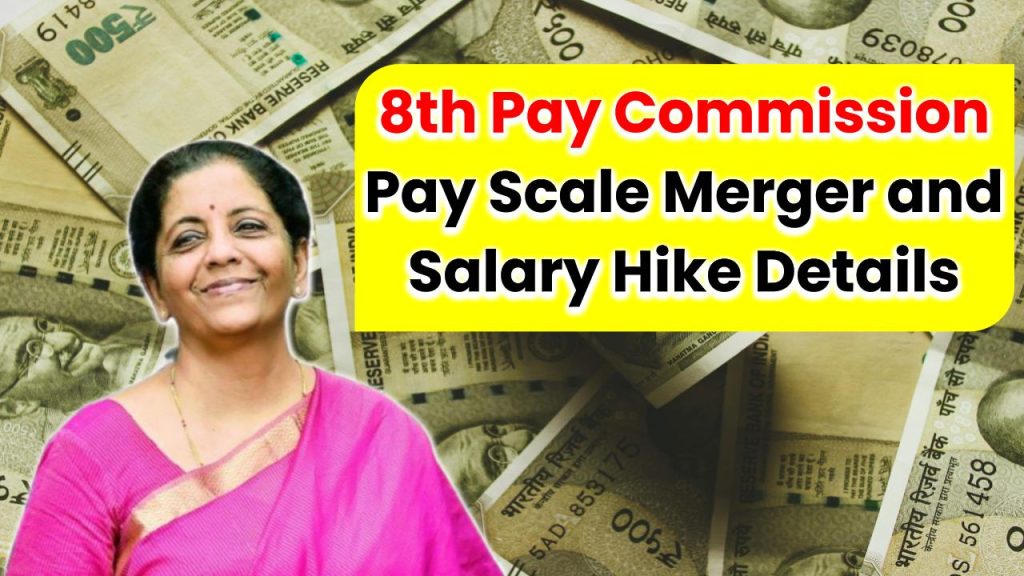
The 8th Pay Commission is set to introduce significant changes in the salary structure of central government employees in India. A major highlight of the upcoming pay revision is the merger of pay scales in Levels 1 to 6, which is expected to bring a substantial increase in salaries. If approved, these changes will benefit millions of government employees and pensioners.
8th Pay Commission
| Feature | Details |
|---|---|
| Expected Fitment Factor | 2.86 (proposed) |
| Minimum Basic Pay Before Merger | ₹18,000 |
| Expected Minimum Basic Pay After Merger | ₹51,480 |
| Pay Scale Mergers | Levels 1-6 combined |
| Expected Salary Hike | 30%-50% increase |
| Total Beneficiaries | Over 1.2 crore employees & pensioners |
| Implementation Year | Likely in 2026 |
The 8th Pay Commission is expected to bring significant salary hikes for central government employees by merging pay scales and revising the fitment factor. Employees in Levels 1 to 6 will see a huge boost in their basic pay, improving financial security and pension benefits.
While the final structure is still under discussion, these expected changes will greatly benefit over 1.2 crore employees and pensioners across India. Keep an eye on official updates from the government for final confirmations.
What is the 8th Pay Commission?
The Pay Commission is a government-appointed body that reviews and recommends salary revisions for central government employees, pensioners, and armed forces personnel. The 8th Pay Commission is expected to be implemented in 2026, replacing the 7th Pay Commission.
One of the most talked-about recommendations of the upcoming commission is the merger of pay scales in Levels 1 to 6, which aims to reduce disparities in salary structure and improve financial stability for employees.
see also: Money stuck in New India Co-operative Bank?
How Much Will Salaries Increase?
Proposed Pay Scale Mergers and New Salary Structure
The merger of lower pay scales means that salaries will be restructured using a higher fitment factor. Here’s a look at the proposed salary hikes:
| Current Pay Level | Current Basic Pay (₹) | New Merged Basic Pay (₹) |
|---|---|---|
| Level 1 (₹18,000) + Level 2 (₹19,900) | ₹18,000 – ₹19,900 | ₹51,480 |
| Level 3 (₹25,500) + Level 4 (₹29,200) | ₹25,500 – ₹29,200 | ₹72,930 |
| Level 5 (₹35,400) + Level 6 (₹44,900) | ₹35,400 – ₹44,900 | ₹1,01,244 |
What Does This Mean for Employees?
- Employees in Level 1 and Level 2 will see a salary increase of over 150%, raising their basic pay from ₹18,000 to ₹51,480.
- Those in Level 3 and Level 4 will get an increase of approximately 140%.
- Employees in Level 5 and Level 6 will see their salaries rise by 130%.
These hikes will significantly improve take-home pay and will also impact pension calculations, house rent allowance (HRA), and other benefits.
Why is the Pay Scale Merger Needed?
1. Reduction in Pay Disparities
The current salary structure has significant gaps between lower and mid-level employees. The merger aims to bridge the income gap and provide more uniform career progression.
2. Higher Disposable Income
With inflation rising, employees in the lower pay scales struggle to maintain financial stability. A higher salary will improve their quality of life and purchasing power.
3. Career Growth & Promotion Opportunities
Merging levels will streamline promotions and create a better progression path for employees, reducing stagnation in lower ranks.
4. Better Pension & Retirement Benefits
Since pension calculations are based on basic pay, higher salaries will lead to increased pensions, benefiting millions of retired employees.
Will DA be Merged with Basic Pay?
A long-standing demand from government employees is the merger of Dearness Allowance (DA) with basic pay. As per the latest updates, the government may consider merging DA into the new salary structure, further boosting the revised pay scales.
- Current DA stands at 50% of basic pay, expected to rise before the implementation of the 8th CPC.
- If merged, employees will get a higher basic pay, leading to better increments, allowances, and pensions.
see also: Avoid This Costly Mistake After Paying Off Your Home Loan
8th Pay Commission FAQs
1. When will the 8th Pay Commission be implemented?
The 8th CPC is expected to be implemented in 2026, following government approval and review.
2. How much will the minimum salary increase?
The proposed minimum salary increase is from ₹18,000 to ₹51,480, subject to final approval.
3. Will pensioners also benefit from the pay revision?
Yes, pension calculations are based on basic pay, so pensioners will receive higher payouts after the revision.
4. Will the fitment factor remain at 2.57 or increase?
The fitment factor is likely to be raised to 2.86, leading to a substantial salary hike.
5. Where can I find official updates?
You can visit the official Department of Personnel & Training (DoPT) website at DoPT.gov.in for updates.











